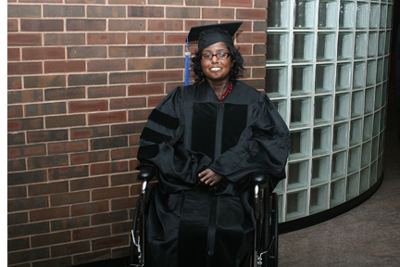
Nicole White earned a doctoral degree in criminology and criminal justice from UMSL. She participated in commencement on Saturday. In 2005, White was diagnosed with a rare disease, which caused her to be hospitalized more than 30 times and lose sight in one eye and mobility.
Like many students, Nicole White studied long hours and got by on only a few hours of sleep each night. So in 2004, while in the criminology and criminal justice doctoral program at the University of Missouri–St. Louis, she shrugged off fatigue and joint pain. But when the pain continued, she decided to talk to her doctor. To her surprise she was diagnosed with Scleroderma, an incurable and possibly fatal disease. Even while facing many health obstacles, she continued to work on her dissertation, and on Saturday she received her doctoral degree.
White, 33, of Belleville, Ill., said that when she was first diagnosed in 2005 with Scleroderma, a connective tissue disease that involves a buildup of collagen in the blood, she was at a loss for words. It affects the skin and joints, and in some cases can attack the heart, lungs and other internal organs.
“It was shocking,” she said.“I didn’t know what it was. Once I learned, I wanted to know what next.”
After learning all she could about the disease and that there was no cure or treatment, White decided she wasn’t going to let it beat her. She had always been interested in criminology and was fascinated by statistics and quantitative research. Her dissertation, “The Economy-Crime Relationship Revisited: The Significance of Recent Macroeconomic and Social Policy Changes for Poverty and Youth Violence Trends,” was something she wanted to finish.
“I had started and wasn’t going to give up,” she said. “I wanted to make sure I was able to complete my research no matter what.”
What started as constant fatigue and joint pain, soon became the inability to sit down or stand up by herself. Over the next several years she would have 11 blood transfusions, lose sight in her left eye and become completely immobile.
“That was one of the hardest parts for me,” White said. “I was fiercely independent, and I had to move back with my mom and rely on others to do everything for me.”
The next few years became a struggle, she was in and out of the hospital more than 30 times, which limited the time she had to work on her dissertation. Still she didn’t give up. Although she was confined to her house and could only access resources online, she continued to work.
“It gave me a purpose,” she said. “At this point, I really didn’t have a life, I was dependent on others for almost everything, but working on this gave me something to do and a way to contribute.”
Janet Lauritsen, professor of criminology and criminology at UMSL, has been White’s faculty adviser since she began the doctoral program in 2003.
“Earning a PhD is a significant accomplishment,” Lauritsen said. “The fact that Nicole was able to complete her degree while battling major health issues has been an inspiration to both students and faculty. She is an extraordinary woman whose intelligence, attitude and hard work led to significant contributions to knowledge about social policies and youth violence, and I am very proud to have served as her dissertation adviser.”
Although White’s health continues to deteriorate, she’s eager for the next chapter of her life as “Dr. Nicole White.”
“I am limited, but would love to continue to do research,” she said. “Having the opportunity to research with faculty or scholars, or assisting on projects, would be amazing and something I’d welcome from anyone.”














